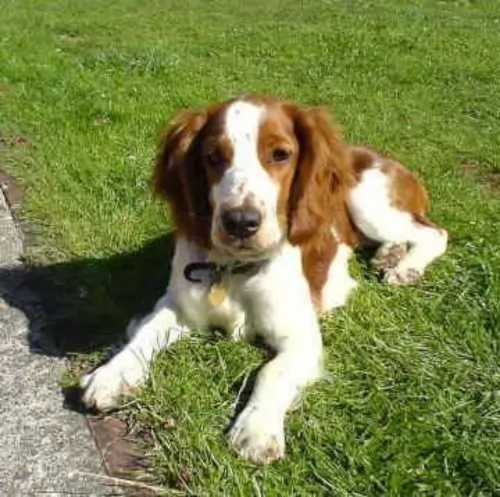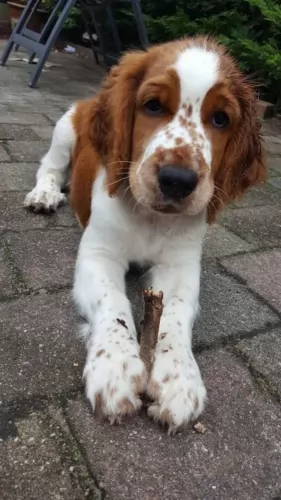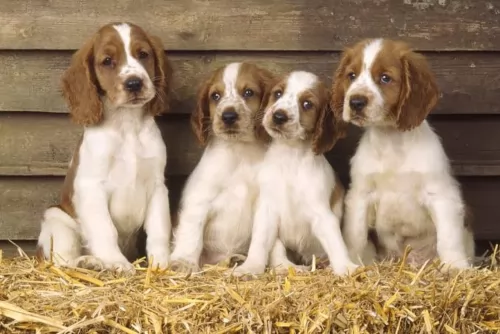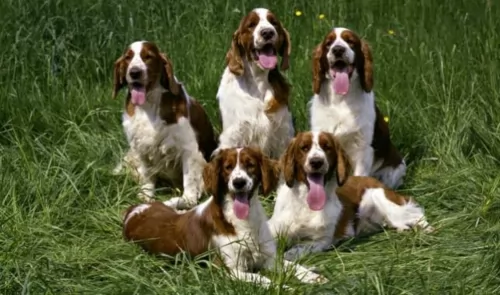 Petzlover
PetzloverBoth English Water Spaniel and Welsh Springer Spaniel are originated from United Kingdom. Both English Water Spaniel and Welsh Springer Spaniel are having almost same height. Both English Water Spaniel and Welsh Springer Spaniel are of same weight. Both English Water Spaniel and Welsh Springer Spaniel has same life span. Both English Water Spaniel and Welsh Springer Spaniel has almost same litter size. English Water Spaniel requires Low Maintenance. But Welsh Springer Spaniel requires Moderate Maintenance
The English Water Spaniel breed is extinct and has been since the early 1900’s. It was last seen in the 1930s. The breed was a hunting breed, diving for duck and hunting other waterfowl. Legend has it that Shakespeare was referring to this breed of dog in Macbeth when he refers to the “water rug”. Again, in Two Gentlemen of Verona one of the character states about another that “She hath more qualities than a water-spaniel.’
The English Water Spaniel came along before the Irish Water Spaniel and had a part in the development the Curly Coated Retriever, the American Water Spaniel and the Field Spaniel. The English Water Spaniel looks somewhat like a Poodle/Springer Spaniel cross or a Collie. It is not known whether the English Water Spaniel was part of the development of the Irish Water Spaniel.
When the English Water Spaniel was first developed the UKC had a “Water Spaniels other than Irish” and the English Water Spaniel had no standard written and accepted for it yet. But by 1967 the breed was extinct. Still the American Water Spaniel and the Flat Coated Retriever are believed to be descendants of the English Water Spaniel.
 The Welsh Springer Spaniel is thought to be an old Land Spaniel similar to the English Springer Spaniel. They were pretty mush an unknown breed until they won a string of dog trials and became more popular. Following this surge the breed was recognized by the UKC in 1902 and were named the Welsh Springer Spaniel. No one really knows when the breed was developed and cannot be traced because of lack of documentation. They were brought to America in the early 1900’s and were recognized as a breed by the AKC (American Kennel Club) in 1906.
The Welsh Springer Spaniel is thought to be an old Land Spaniel similar to the English Springer Spaniel. They were pretty mush an unknown breed until they won a string of dog trials and became more popular. Following this surge the breed was recognized by the UKC in 1902 and were named the Welsh Springer Spaniel. No one really knows when the breed was developed and cannot be traced because of lack of documentation. They were brought to America in the early 1900’s and were recognized as a breed by the AKC (American Kennel Club) in 1906.
There are images of a dog looking a lot like the Welsh Springer Spaniel in old prints and pictures. The pictures are of a dog known as a Land Spaniel very much like the Welsh Springer Spaniel. These dogs were thought to be preserved by the Welsh and originally called the Welsh Starter. It was a hunting breed working with falcons.
At one point the breed was called the Welsh Spaniel and was also in the UK studbook as a Cocker Spaniel or a Welsh Cocker. There were several different types of Cocker Spaniels including the English Cocker, the Welsh Cocker, the Devonshire Cocker. The Welsh Cocker Spaniel was a solid dark color while the Welsh and Devonshire Cockers were liver colored.
Following World War II there were no dogs left in Wales or anywhere else in the United Kingdom whose parents were registered pedigree. The unregistered dogs were used to restart the breed and these dogs are the ancestors of the modern Welsh Springer Spaniel.
The breed is still rare with only 299 registered in the UK in 2016. They are listed now a vulnerable Native Breed.
Resembling the Springer Spaniel, poodle, collie and setter the English Water Spaniel has very little in common with the Irish Water Spaniel in respect to looks. The English has a narrow and somewhat longer head their than other spaniels and they have long furry ears. Their body is stout, and they are shaped like a barrel – more like a Clumber. With long legs and large feet, it is ready to take to the hunt. There coat was waterproof, and their toes were webbed.
 The breed is a medium size, solid and compact dog bred to work. Their forequarters are angled and there hindquarters are well developed. This is a very good looking breed that is only red with white markings. A hard working dog bred to hunt. They are slighter longer than tall and are not penalized as long as the height tis not greater than the length.
The breed is a medium size, solid and compact dog bred to work. Their forequarters are angled and there hindquarters are well developed. This is a very good looking breed that is only red with white markings. A hard working dog bred to hunt. They are slighter longer than tall and are not penalized as long as the height tis not greater than the length.
The tail in docked except in countries where it is illegal to do so. Their eyes should be brown. Noses are black or brown. The ears are small with a fethering like most setters. The show and field styles are the same. They are confused with the Engolish Springer Spaniel even though there are many differences. But both breeds are born to hunt and “spring” at the prey. They are smaller than the English Springer Spaniel and larger than the English Cocker Spaniel.
The English Water Spaniel was aloof with strangers but loyal with his hunter. He was a little stubborn and an excellent water dog. They loved being in the water and could enter it without making any noise so as not to frighten his prey. He was highly intelligent and trainable. He also was very affectionate with his people.
The English Water Spaniel is a fairly healthy breed given to some fairly common disorders such as:
Can lead to lameness and arthritis
Arterial fib and flutter and other problems that could lead to death.
This is a disease seem in several “Dwarf” breeds such as Corgis, as well as in many spaniels. This is the canine version of Lou Gehrig’s Disease or ALS and it is fatal.
 • Eye Diseases – Glaucoma can cause blindness; Entropian – eyelids curl inwards and can damage the cornea.
• Eye Diseases – Glaucoma can cause blindness; Entropian – eyelids curl inwards and can damage the cornea.
The English Water Spaniel is not an overly energetic dog and has a tendency to over eat. Feed him 1 to 1.5 cups of high quality dry dog food over two meals each day.
In addition to the health issues mentioned earlier, the English Water Spaniel is also prone to:
Pattern baldness – is genetic and occurs on the neck and back of the hind legs.
English Water Spaniels can have these in old age like most other breeds.
Clumps form in the retinal tissue and can lead to blindness
The English Water Spaniel was a worker and an outdoor athlete at a time before organized canine games and activities such as agility and flyball. They loved to swim, and they loved to hunt. Without a job to do they could become barky and destructive.
 1Feeding the puppy active puppy. Feed breed specific or medium breed high quality dogfood. Feed ½ -3/4 cup in 2-3 meals
1Feeding the puppy active puppy. Feed breed specific or medium breed high quality dogfood. Feed ½ -3/4 cup in 2-3 meals
2.Feeding the adult active breed. Feed breed specific or medium breed high quality dogfood. Feed 1-1/2 cup in 1-2meals
4. Games and Exercises – Needs a secure fenced yard. Loves sports and outdoor activity. Agility, obedience, rally, tracking and loves to run, bike and hike.